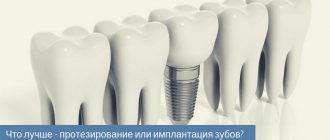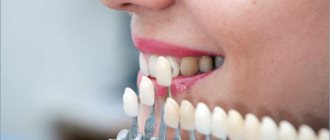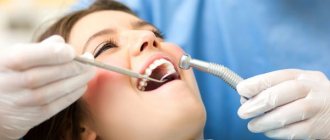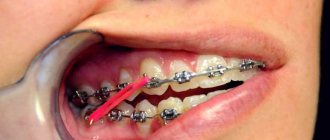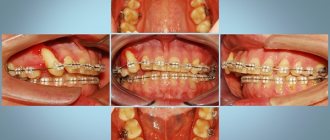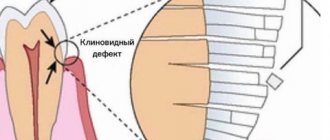If one or more teeth are lost, doctors may recommend implantation as a restoration method. However, there are contraindications to dental implantation, which you should know about in advance. Each procedure has its own advantages and disadvantages. By being aware of the real risks, you can weigh the pros and cons and make the right decision.
In order to completely fill the functional task and aesthetic parameters of the jaw and teeth, it is necessary to install an implant identical to the natural one, which will be firmly fixed in the bone, protect it from atrophy, and tolerate stress well during meals.
Its installation should not change the bite of the jaw and differ from the patient’s natural teeth. Important to remember! Installation of implants is a surgical procedure that makes a certain change in the structure of the bone.
The postoperative period includes treatment that affects all systems in the body, due to which the person experiences some stress. What are the contraindications to implantation and complications after implant installation? Let's take a closer look.
Indications and contraindications for dental implantation
When is implantation indicated?
- Missing one or more teeth in a row. In case of a single defect and the absence of 2 teeth in a row, implants are implanted in place of each tooth with separate crowns. If 3 or more teeth are missing, it is not necessary to restore each tooth with a separate implant - it is possible to install a smaller number with a fixed bridge.
- Absence of terminal teeth. Implants replace lost units and serve as support for prostheses.
- Edentia (absence of all teeth). The situation is diagnosed in older people who did not seek medical help in time. The dentist may suggest installing dentures on 4 or 6 supporting implants.
- Intolerance to traditional dentures. Removable structures cause discomfort in the mouth and irritate the mucous membrane. Structures with extensive defects are not held in place. If the use of dentures is not possible, dentists recommend implantation.
- Malocclusion. With some congenital or acquired defects in the structure of the jaw, the bite is disturbed and the teeth take an incorrect position. If treatment cannot be carried out in any other way, implants are installed.
General restrictions on the operation
- Blood clotting disorders, taking anticoagulants (blood thinners);
- poor oral hygiene;
- bruxism (uncontrollable grinding of teeth);
- diseases that impair the regeneration of bone and soft tissue;
- infectious diseases of the oral cavity (gingivitis, periodontitis, stomatitis);
- metabolic disorders that slow wound healing and bone restoration;
- insufficient occlusion;
- therapy aimed at suppressing the immune system (radiation, chemotherapy);
- insufficient amount of bone or soft tissue.
Related articles:
- Guarantees of our center
- Possible complications
- Indications for implantation
Is it possible to insert dental implants into older patients?
Thanks to modern technologies and a variety of techniques, implants can be placed on all patients. A professionally performed operation is safe and will allow you to enjoy a full life without being distracted by such inconveniences as missing or defective teeth.
Every year new equipment, materials and installation methods appear on the market, making implantation accessible to an increasing number of people who want it, so there is no concept of an age limit for dental implantation .
Moreover, for many elderly patients it is the only possible option for tooth replacement, due to intolerance to dentures.
Absolute and relative contraindications
Absolute contraindications are those that make the procedure impossible. These include:
- mental disorders characterized by inappropriate behavior of the patient;
- diseases of the blood, hematopoietic organs;
- tuberculosis in the acute stage;
- connective tissue pathologies;
- malignant tumors on the head, neck;
- slowing down blood clotting, complicating stopping bleeding and wound healing;
- chronic alcoholism, drug addiction;
- diseases of the immune, central nervous system;
- impossibility of anesthesia due to allergic reactions;
- congenital anomalies of the jaw that prevent the implantation;
- age under 18 years;
- renal failure.
Relative diseases include diseases and conditions that can be eliminated and then implanted:
- poor nutrition;
- venereal diseases;
- endocrine pathologies;
- diseases of the temporomandibular joint that interfere with opening the mouth;
- anemia;
- viral infections;
- smoking;
- regular stress, exhaustion;
- diseases eliminated by dental treatment;
- insufficiency of bone tissue.
Relative contraindications include chronic diseases that require regular monitoring by doctors (compensated diabetes mellitus, HIV, hepatitis).
Recommendation on how to protect yourself from implant rejection
It is important to exclude the options that we have given above, which may cause side effects.
When implanting tissues are always damaged, it is a bloody operation
Taking medications prescribed by your doctor and proper regular oral hygiene are an important part of prevention for proper healing.
When deciding on a transplant, do not forget that bad habits, kidney and liver diseases, diabetes and even sinusitis can cause rejection. If you cannot change your HIV status due to the nature of the disease, but you can cure others, or refuse implantation.
Obstacles to implantation in the upper and lower jaws
The main obstacle to implantation is atrophy of the bone of the upper or lower jaw. After the root of a natural tooth is removed, the alveolar process becomes thinner over time. If you install an implant into atrophied bone tissue, over time it will deteriorate even more, and the metal part of the artificial tooth will be exposed. To prevent complications after implantation, jaw bone augmentation is performed.
Problems when installing an implant in the upper jaw are caused by sinusitis - an inflammatory process in the maxillary sinus of the nose. The infection that causes the disease weakens the immune system and complicates the operation. Since the implants are located near the sinuses, pathogenic bacteria can spread to the jaw tissue. The inflammatory process that develops leads to rejection of the metal part of the implants.
How long do implants take to take root and when can they be rejected?
If we consider a positive scenario, then the installed implant will completely take root within a year. The maximum period after implantation during which problems may appear is 2 years.
Within 4-8 months, the implantation site may only heal. If the advertisement indicates that installation takes 2 days, then know that the marketers forgot to indicate that photographs, impressions or scans need to be taken, implantation and an adaptation (rehabilitation) procedure must be carried out.
You need to understand that problems can begin on the second day after implantation. But it is important to understand that problems may arise during any medical operation. Even after a painkiller injection, you can die, but the problem is purely a professional problem, it does not depend on your HIV status.
An experienced doctor will be able to install the implant, causing minimal damage to the tissue and ensuring healing.
Let's look at situations in which problems may arise.
What explains the restrictions in case of illness?
Diabetes
The disease is characterized by impaired absorption of glucose in the body, which leads to a number of irreversible changes. Diabetes mellitus damages blood vessels, complicates wound healing, and slows down the healing process of the implant. Bone tissue becomes thinner and thinner. This fact further complicates the operation.
But diabetes is not an absolute contraindication to implantation. The procedure is carried out if the patient is receiving treatment and blood sugar levels do not exceed 6 mmol for the last 2-3 months. In this case, if there is a sufficient amount of bone tissue, dentists choose a one-stage implantation method that does not require massive incisions in the jaw tissue. But if diabetes has led to damage to internal organs, excess weight, high blood pressure, implants are not installed due to the risk of heavy bleeding.
Thyroid diseases
Thyroid diseases lead to hormonal imbalance and affect the structure of bone tissue. With hyperthyroidism (excess hormone), mineralization is inhibited and cells do not receive enough nutrients. With hypothyroidism (lack of hormones), the process of bone tissue restructuring slows down.
Both conditions affect the survival rate of implants and create a risk of rejection of the metal part. But if the patient is undergoing treatment, surgery is possible depending on the patient's condition.
Oncology
For malignant tumors, surgery is performed after the patient has recovered. The risks of developing complications from cancer are too great. Surgery is prohibited if:
- there are metastases;
- neoplasms are located in the face, neck, head (damage to the tumor during surgery leads to further metastases);
- chemotherapy and radiotherapy treatment are carried out (the procedure slows down cell regeneration and interferes with healing).
Hepatitis
The disease is caused by viruses, the most dangerous of which are hepatitis B and C. The disease is not considered a contraindication to implantation, but dictates restrictions. They are associated with possible complications after implantation:
- difficulties in stopping bleeding (increased bleeding develops against the background of damage to liver cells, leading to a decrease in the concentration of coagulation factors);
- risks of developing an inflammatory process against the background of a weakened immune system;
- additional burden on the patient's body.
Implantation is possible after therapy aimed at eliminating inflammation. The patient is given an extended list of tests that he needs to undergo before the procedure.
HIV infection and AIDS
HIV is an immunodeficiency virus that attacks cells of the immune system. As a result, the body becomes unstable to infections; even a cold can be deadly.
Implantation for HIV diseases is possible only in the initial stages, if the patient’s immunity is still strong. In the later stages of the pathology, there is a high risk of infection during surgery, which can lead to the death of the patient. Even ordinary bacteria that live in the mouth often provoke the development of inflammation.
Rheumatoid arthritis
This is an autoimmune disease that causes a number of pathological conditions in the oral cavity:
- formation of cysts and gaps between teeth;
- disturbances in the functioning of the parotid glands;
- the appearance of disocclusion of the dentition;
- inflammation of the trigeminal nerve;
- destruction of bone tissue;
- deformation of the head of the temporoinferior joint.
Rheumatoid arthritis is not a contraindication to implantation, but the patient will have to undergo a number of tests. Based on the results obtained, the doctor determines the size of the bone structures, the condition of the jaw tissue, and makes a conclusion about the possibility of installing implants. After the operation, the process of engraftment of artificial roots lasts from 3 months to a year . During this time, the patient undergoes regular tests and receives dental consultations.
Anemia
Anemia is a condition in which the number of red blood cells (erythrocytes) decreases. The consequence is a low level of hemoglobin, which is responsible for the delivery of oxygen to tissues and organs. Since the transport function of the blood is impaired, complications may arise during the operation.
When assessing the condition of a patient with anemia, the doctor pays attention to the rate of development of the disease. If the decrease in hemoglobin levels occurs slowly, the body adapts and does not experience a lack of oxygen. In this case, surgery is possible if the hemoglobin level is at least 90 g/l . If anemia develops rapidly, implants are introduced only after the patient has recovered.
Diseases of the cardiovascular system
If a person suffers from cardiovascular pathologies, implantation is contraindicated:
- when using general anesthesia or local anesthesia with epiniphrine;
- with a pacemaker installed;
- at risk of cardiac arrest or heart attack.
If a patient suffers from hypertension, before surgery he visits a cardiologist and undergoes a course of treatment to reduce blood pressure. For such patients, we recommend implantation during sleep under sedation - the person does not experience stress and is calm. Along with the sedative, drugs are administered that reduce blood pressure and correct the functioning of the heart. These measures help minimize blood pressure spikes.
Periodontal disease and periodontitis
Periodontitis is an inflammatory process in the soft tissues surrounding the tooth. With this disease, the alveolar process in which the tooth root is fixed is destroyed. At a late stage of the disease, the tooth becomes loose and falls out. Implantation for periodontitis is carried out after treatment and elimination of the cause of the disease.
Periodontal disease is a pathology in which the bone tissue of the jaw is slowly destroyed, but there is no inflammation. At an early stage, the tooth remains fixed and does not wobble, so it is not advisable to introduce implants. In the later stages, the root gradually becomes exposed, the tooth becomes loose and falls out. In this case, the only way to restore lost teeth is implantation.
Make an appointment with an implantologist
Preparation is the foundation of subsequent treatment
Before dental implantation, the doctor will definitely examine the condition of the oral cavity for the presence of any diseases and will definitely eliminate them. In addition, the patient needs to undergo an X-ray examination - cone beam or multispiral computed tomography of the jaw and undergo a series of tests.
Based on the diagnostic data, the dentist will plan the implantation. In special computer programs, the models and number of implants are selected for a specific patient, and they are placed on a virtual “jaw”. Additionally, surgical templates are printed to ensure precise placement of the implants so that they are placed in the specified areas and can withstand chewing loads for many years.
What other conditions affect the possibility of installing implants?
Features of implantation in women
The female body is characterized by a number of conditions that cannot be called pathological, but they become temporary obstacles to the implementation of implants:
- Menstruation. Doctors recommend refraining from surgery during menstrual bleeding. The main danger is excessive blood loss and the possibility of uncontrolled bleeding. The operation is complicated by the high risk of blocking blood vessels, since during menstruation the blood in the female body has increased clotting. During menstruation, patients are susceptible to nervous breakdowns: the procedure can harm the woman’s morale.
- Pregnancy. Anesthetics and other medications, X-rays have a negative effect on the unborn child. Also, during pregnancy, the immune system is weakened and cannot fully resist pathogens, which creates a risk of developing inflammation.
- Breast-feeding. During breastfeeding, medications administered to the patient pass into the milk. Toxic substances cause allergies and other undesirable consequences in the baby.
A woman needs to wait until these conditions pass. Then it will be possible to install implants.
Are there any restrictions for older people?
Older patients must be sent for examination of the state of their health. If older people do not have general obstacles to the procedure, implantation is not contraindicated, but the recovery period takes longer. This is due to a slowdown in regeneration processes in old age. To reduce the risk of complications, dentists carefully prepare the patient’s oral cavity and choose minimally invasive surgical methods.
Is implantation performed for children?
in children under 18 years of age . As a child grows, jaw bones grow and teeth change. If an implant is placed in childhood, over time it will become too small and will have to be reinstalled. If the baby does not have dental units, dentures are used. The issue of implantation is decided upon when the child reaches the age of 18-22 years.
Is it possible to install implants for smokers?
Smoking increases the risk of implant failure. One cigarette smoked after surgery reduces tissue repair by 30% . But this is not the only danger. When smoking, the mucous membrane burns and the wounds heal slowly. A bad habit leads to disruption of saliva production. The mouth constantly feels dry, the mucous membrane is not cleared of pathogenic bacteria, and the risk of infection increases.
Is it possible to hide your HIV status from the dentist?
There is always a temptation to hide your illness. This can, of course, be done, but the question is how much in this case you will receive medical care, after which problems, both inflammatory and legal, will not follow.
The doctor gives you implants based on knowledge of your condition. Let's say he doesn't know that you have HIV. Without knowing this, he will not prescribe an increased dose of antibiotics, but will prescribe a standard dose, as for a healthy person.
When performing surgery, there is always a chance that the doctor may puncture the glove and your blood will get on it. If, when performing an operation on a healthy patient, he simply washes his hands, treats the wound with an alcohol raster and replaces the glove, then during the surgical intervention you need to use the products from a special first aid kit.
If he doesn’t do this, he will get sick, a sick person will appear on your conscience, and you can go to trial for intentional infection.
If you have an undetectable viral load, then most likely the risk is minimal, but this is not a reason to hide your illness.
Correct diagnosis and planning are the key to success
For the procedure to be successful, the patient needs to carefully prepare for it. An important role in the process is played by examination to identify contraindications and possible limitations.
Diagnostics is carried out in 3 stages:
Initial examination of the patient
It includes a conversation between the dentist and the patient to collect anamnesis, and an examination of the oral cavity. The doctor informs the patient about the obstacles to the procedure, talks about methods of treating diagnosed diseases, features of implant installation, and possible complications.
Analyzes
After the examination, the dentist prescribes a number of tests for patients with a history of diseases that may become an obstacle to implantation. They are necessary to assess the patient’s health status and identify diseases of internal organs. Before installing implants, it is recommended to undergo a general and biochemical blood test, urine test, and tests for viral hepatitis and HIV. Women take a pregnancy test.
CT
Computed tomography is prescribed before surgery for a detailed study of the structure of the teeth, identifying the remains of the root of a destroyed tooth, etc. After the introduction of an artificial root, research is necessary to monitor the engraftment process and prevent complications.
If the patient's condition is satisfactory, a treatment plan is drawn up. At the preparatory stage, the patient needs to take future surgery seriously. Do not hide conditions from your doctor that may lead to complications. Honesty in your relationship with your doctor ensures a quick recovery period.
Research and diagnostics can be performed at our Center for Private Dentistry “Doctor Levin”. The surgical department staff includes a neurologist, anesthesiologist, therapist and otolaryngologist. Laboratory tests can be taken without leaving the clinic.
Installation of the healing abutment
When the doctor is sure that the implant has taken root, he will install a gum former for you. The name speaks for itself: the former is needed to prepare the gums for future prosthetics: installation of an abutment and crown.
Oleg, the operation took place in 2013:
“You know, after the operation and recovery, installing the shaper is just kindergarten, easy. It felt like a filling had been placed, at least in terms of time it was approximately like that. I spent 2 weeks with the former, and then they took impressions and put a crown on me within a month. Beauty!"
Approximate costs at this stage:
- Installation of a gum former: 5 thousand rubles
- X-rays (possibly) from 300 to 1200 rubles
Question answer:
I had an appointment with an implantologist and recommended basal implantation. What are the contraindications to this method?
Contraindications for basal implantation do not differ from other types of surgical interventions. The difference between this method and the classical one is that implants are installed in the outer layer of bone tissue, the cortical plate. We do not welcome this method, but some clinics note the advantage of the technology in that it avoids the build-up of the lower spongy layer involved in classical implantation. Such fixation cannot be called reliable, although the basal bone is less susceptible to atrophy. In world dentistry, this technology is called Temporary Implantation and is not suitable for installing long-lasting implants. The method is used if the patient is missing 3 or more dental units (artificial roots are inserted at an angle and damage to adjacent roots is possible).
Are there any restrictions for immediate installation of implants?
With simultaneous implantation, tooth extraction is combined with implant installation during one operation. The procedure is planned in advance so that the patient has time to undergo the examination. If there are general contraindications, the operation is not performed. If purulent formations are found on the root of the tooth, the introduction of implants is postponed until the infection is eliminated and the bone tissue is restored. A limitation for manipulation is damage to the alveolar process when removing a natural tooth.
How is re-implantation performed after rejection?
The first step is to rehabilitate the patient. The wound channel should be completely restored. The decision on re-implantation is made by the doctor, after a medical examination is carried out and the results of the images are obtained. The physician must also understand that in patients with HIV, with a CD4 count of more than 500 cells, the risk of rejection will be similar to the patient’s HIV-negative status. If the cell level is low, bacterial or fungal infections may occur in the implant area.
If implantation is not suitable for you, or the implant does not take root, then you always have a backup option - a removable denture. It is done even with complete loss of teeth and at the moment it performs its function perfectly.
Myths
Takes a lot of time
Installing an artificial titanium root takes only about an hour. It takes longer to install a permanent crown.
Between the installation of implants and the installation of the prosthesis, it takes from two days to four months. This period depends on the individual characteristics of the patient, clinical indications and osseointegration.
Osseointegration is an anatomical and functional relationship that occurs between bone tissue and an implant due to chewing force.
It's too expensive
Modern dentistry offers implants of different pricing policies - cheaper (affordable to the majority of the population) and expensive. The price depends on the materials and the preparatory stage.
If we compare the price of an ordinary prosthesis and an implant, the difference in price seems significant.
But you need to take into account that in order to install an ordinary prosthesis, it is necessary to treat these teeth: take several pictures, remove the nerve, insert a pin, put a high-quality filling - and this also costs money.
Removable dentures, although comfortable, cause some psychological discomfort - they need to be removed, washed, processed, and over time they have to be replaced with new ones.
Permanent dentures also do not last forever - the gums sag, gaps form between the crown and the ground tooth, and the tooth begins to decay.
There is a need to replace the entire prosthesis, which leads to new financial costs.
ROOTT implantation is fast, reliable, durable, painless, and economical.
Prices for installing implants depend on the materials, preparatory stage, clinic, doctor’s qualifications and type of service:
| Type of service | Price |
| Classic, made in Israel (without crown) | from 21,000 rub. |
| Classic, made in Switzerland (without crown) | 25,000 – 28,000 rub. |
| Single-stage, made in Switzerland with a crown | 35,000 – 41,000 rub. |
| Single-stage (Switzerland) with zirconium dioxide crown | 65,000 rub. |
| Complete one-stage complex implantation of one jaw | RUB 295,000 |
| Complete one-stage complex implantation of both jaws | 550,000 rub. |
| Classic implant with tooth extraction and immediate installation | from 40,500 rub. |
| Removable denture for one jaw on four implants | 136,000 rub. |
The average prices for clinics in Russia are indicated. Cost may vary. Some clinics hold various promotions.
Before carrying out manipulations, you need to accurately determine from a specialist the cost of the final work - installation of implants and crowns.
The cost of the crown is often not included in the cost of the work, since the price depends on the choice of material: gold, metal-ceramics, metal-plastic and other materials.
The cost of the implant includes anesthesia, installation, examination, warranty, and doctor’s work.
Implant prices:
| Premium class (very high quality, with a lifetime guarantee) | Nobel Biocare (Switzerland-USA) | 40,000 – 70,000 rub. |
| Straumann (Switzerland) | 40,000 – 50,000 rub. | |
| XIVe (Germany) | 30,000 rub. | |
| Anthogyr (France)- | 20,000 rub. | |
| Astra Tech, manufacturer Sweden | 35,000 – 45,000 rub. | |
| Mid-level (cheaper, but high quality) | Dentsply Friadent | 20,000 – 30,000 rub. |
| Schutz (Germany) | 18,000 – 30,000 rub. | |
| Zimmer (USA) | 18,000 – 30,000 rub. | |
| Niko (Liko), Russia | 23,000 – 30,000 rub. | |
| Budget option (good quality and demand) | Mis (Israel), Ards, AlphaBio | 15,000 – 24,000 rub. |
| Implantium, Korean quality | 13,000 – 25,000 rub. | |
| Budget option (lower quality) | Implants from former CIS countries | 7,000 – 17,000 rub. |
These are the same prostheses, but more expensive
Implants are fundamentally different from prostheses:
| Comparison | Single-stage implantation | Classical | Prosthetics |
| Traumatization | Minimal, no gum peeling occurs | Trauma due to gum peeling | Depulpation and grinding of healthy teeth |
| Deadlines | Up to a week | 2 – 4 months | 2 – 3 weeks |
| The need to build bone tissue | Absent | Required according to indications | Absent |
| Bone tissue atrophy during use | There is no atrophy | Occurs over time, teeth may shift | |
| Chewing function | Recovers in 3–4 days | Recovery up to six months | Recovers immediately |
| Aesthetics | The level is average due to the artificial gum area (with bone atrophy). Re-prosthetics possible | Great aesthetics | High but temporary aesthetics of bridges. Low – for removable |
| Stabilization of the prosthesis | Excellent | Reliable | Depends on the supporting teeth. Removable dentures require additional fixatives (adhesives, creams) |
| Service life | Lifetime | Bridge-like – 5 – 20 years. Removable – 3 – 5 years | |
The conclusion that dentures and implants are not the same thing is obvious.
It takes a long time to prepare for the process.
The duration of preparation for implantation depends on many reasons. First, the doctor examines the patient, collects anamnesis, prescribes an examination, and then, if necessary, prescribes consultations with specialists.
If there are no contraindications, the implantologist will schedule the day of surgery. If the patient requires specific treatment prescribed by an endocrinologist, neurologist, therapist and other specialists, the time of the operation is postponed.
Often the patient requires complete sanitation of the oral cavity.
While they are taking root, the patient walks without teeth
At the patient's request, temporary crowns or dentures are installed, especially if the implantation area is visible when smiling.
They do it badly in Russia
Choosing a clinic, a doctor of the highest category, trained by leading specialists in the country and abroad, who has mastered the latest technologies, guarantees the quality, aesthetics, and durability of your new teeth.
Choose a clinic that has sufficient experience in carrying out such manipulations; choose a specialist who suits your professional and psychological qualities. Find materials about implantation on the Internet, read, study reviews.
Do not hesitate to ask your doctor about the slightest nuances of the future procedure and its consequences.
Original implants come with a manufacturer's warranty and certificate. The doctor's work is guaranteed for 2 years.
It takes a long time to get used to them
Installing a permanent structure makes getting used to it very fast, especially if the upper part – the crown of the tooth – is chosen correctly. Literally after a few days (with high-quality medical intervention), the patient forgets that he had implants implanted.
Tip 1: Caring for implants is exactly the same as caring for natural teeth: brushing twice daily with toothpaste, rinsing after meals, using dental floss if necessary, visiting the dentist at least once a year, and having routine professional teeth cleanings in the clinic.
Tip 2: It is advisable to purchase an electric brush with pulsation technology for brushing your teeth, as well as an irrigator for irrigating interdental spaces and removing plaque.
Possible complications
Dental implants are a foreign material for the body, so the risk of complications can never be excluded. Modern product installation methods and techniques can minimize this risk as much as possible.
Possible complications:
- seam divergence;
- severe pain for more than three days;
- formation of hematomas;
- the appearance of bleeding;
- development of soft tissue inflammation.
Such complications are rather exceptions that arise due to compliance with the doctor’s advice on care during the rehabilitation period.
Somewhat more often, implant rejection and inflammation of the bone and gum tissue near the implant occur. The cause of inflammation can be insufficient oral care or violation of doctor’s recommendations. Implant rejection is an individual reaction of the body. The result is also influenced by which doctor places the dental implants. A qualified specialist will not make mistakes during the operation, and will monitor the patient’s condition throughout the entire rehabilitation in order to take timely measures and prevent complications.
